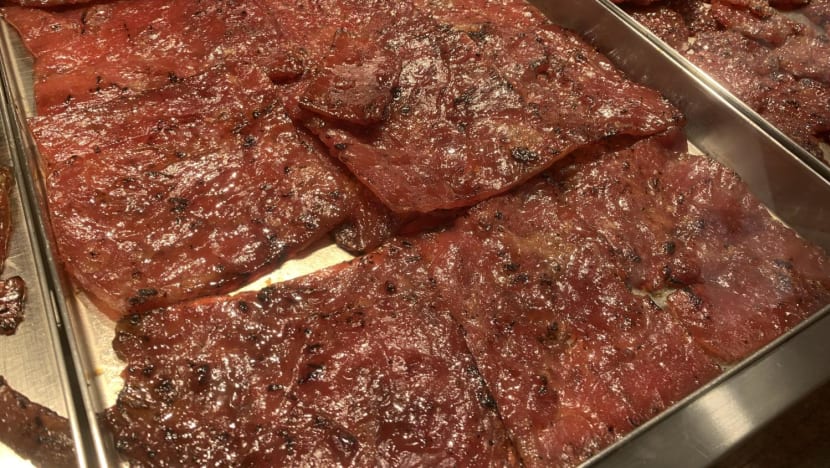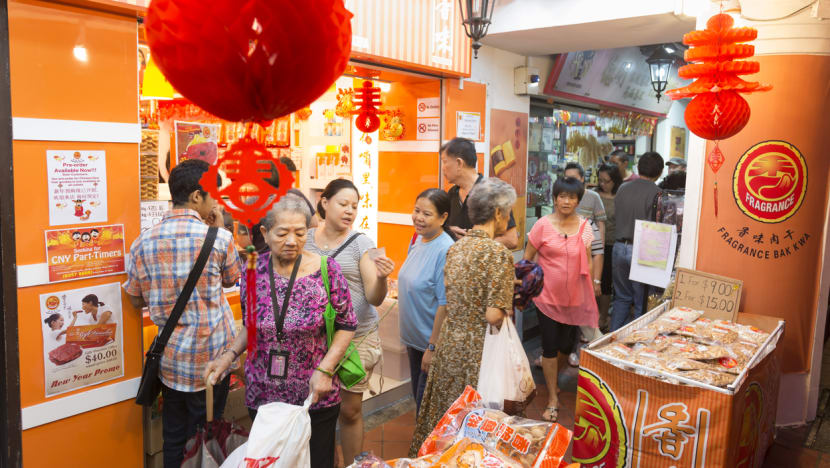Commentary: How do bak kwa businesses survive outside of Chinese New Year?
Local food firms deserve more credit in diversifying their product offerings, making inroads overseas and selling digitally, says SMU’s Tan Wee Liang.

Bak kwa on display in a shop (Photo: Charlene Tan)
SINGAPORE: Chinese New Year may be over but there’s nothing like the smell of smoky bak kwa (barbecued pork) in the air, with pieces of the dried barbecued meats offered as treats at every home visited, that symbolises these festivities.
“Bak kwa sales during Chinese New Year is enough to cover (a shop’s profit) for the entire year,” actress Constance Song said in outlining why she partnered a friend to start an Iberico pork bak kwa business.
The festivities over the past two weeks are indeed peak periods for food businesses, like bak kwa, bak chang (rice dumplings) and pineapple tarts.
But long, snaking queues at Lim Chee Guan in the lead-up can give the wrong impression that bak kwa is a seasonable business, with demand being low when the particular festival is over.
THEY OFFER MORE FOOD PRODUCTS
Unless they involve seasonal agricultural produce tied to harvests and deliveries, bak chang, bak kwa and mooncakes can be eaten and are available all year round.
Many such businesses have also diversified into other products not confined to specific festivals.
Bak kwa businesses, like close to 90-year-old Bee Cheng Hiang (BCH), sell pork floss in addition to an extension of products like pastries (cookies, rolls and mini-crunchies), broth, ramen and even French Bordeaux wine, with labels handpicked by wine specialists.
All their products with the brand BCH are produced by the company, with the items snapped up when they’re listed on Lazada and Shopee.

It is necessary for any business to innovate and expand its product range, building on the business’ strengths. In this, BCH, fortunately, discovered an added value product they could produce: Collagen broth.
Likewise, traditional bakery Tai Chong Kok, famed for its mooncakes, has eight outlets over the island selling Chinese pastries, with items for special occasions like weddings and gift sets, in addition to mooncakes. It is now known for its egg tarts as well.
THE BCH STORE AS A DISTRIBUTION POINT FOR OTHER SNACKS
Traditional businesses too have expanded their string of physical outlets knowing these bring them benefits and fresh opportunities. BCH can leverage its outlet chain to act as a distribution network with stores featuring a range of snacks and use these locations to test the waters for new foodstuff.
During my visit in 2020, BCH’s Singapore factory was producing experimental innovations to appeal to a younger consumer base. Riding on certain food trends at that point, they put out scrumptious pastries like bak kwa burnt cheesecake and bak kwa chiffon cake.
They even started a bak kwa themed bistro called the BCH Grillery at Serangoon Road, incorporating their signature bak kwa into their menu and giving people the opportunity to barbecue meats and make one’s own concoction of pork floss, as well as try out wine-meat pairings.
GO DIGITAL AND BUILD ON BRAND AWARENESS
Although some have gone digital to reach more potential consumers, it was the pandemic that finally pushed laggards like Lim Chee Guan to embrace digitalisation.
The initial hesitancy is understandable when commitments in capital outlay and talent with expertise in social media marketing are needed to go digital. Time is also needed for the online store to take off.
Yet with the right marketing strategy and products, matched with the brick-and-mortar presence, traditional businesses selling such foodstuff can soar. Having an online presence allow traditional businesses to leverage their brand recognition to stand out in a busy online marketplace.
They can also test the market for new products with small quantity production, allow for organic growth before embarking on larger-scale production when the demand increases.
Having an online presence not only creates convenience but can also introduce such brands to new audiences overseas.
GOING OVERSEAS
Traditional businesses can and should expand overseas where markets are bigger. BCH expanded its product range and went beyond Singapore’s shores. BCH explored going regional more than a decade ago.
In 2007, a group of SMU students that I supervised were commissioned to find out whether the Vietnamese would take to BCH’s bak kwa since the Vietnamese have their version of jerky. Looking back at those beginnings and the number of stores in Vietnam, the results from the study certainly came to good use.
Today, BCH has outlets all over Asia, with stores in major cities in China, South Korea, Taiwan, Indonesia, Vietnam and Malaysia and factories in most of these destinations, which aid to factor in dietary considerations, food import restrictions and food safety requirements when the foodstuff is made.
This expansion is in tandem with demand for its products. BCH has 10 factories in Asia. Except for Taiwan, all their outlets are self-owned.
BCH is also going out of its way to promote its brand to hire talent. In 2019, my SMU Masters class and I visited their manufacturing plant near Seoul in Suwon city and met Jean Ang, the group general manager of Chop Hup Chong, BCH’s manufacturing arm, who flew in from Singapore.
They had the opportunity to interact with the Singaporean managers stationed there. They learnt about international operations, the cross-cultural management of host country staff, the challenges of replicating manufacturing facilities and the need for good personnel willing to be posted overseas.
TRADITIONAL BUSINESSES CAN FLOURISH
Traditional businesses like the bak kwa business can diversify their offerings and still flourish. It’s a myth they survive by the skin of their teeth in trying to sell as much of their signature products during periods of high seasonal demand.
The journey to expand, innovate and enhance business activities requires resources and careful planning. But if done well, such efforts could put Singapore foods on the international food map.
In a world where the lifespans of businesses are shortening, knowing companies who make childhood favourites are doing more to buck the trend is heartening. Bak kwa will remain around for a while.
Dr Tan Wee Liang is an Associate Professor of Strategic Management at the Singapore Management University’s Lee Kong Chian School of Business. He owns no shares in the firms mentioned here.


















